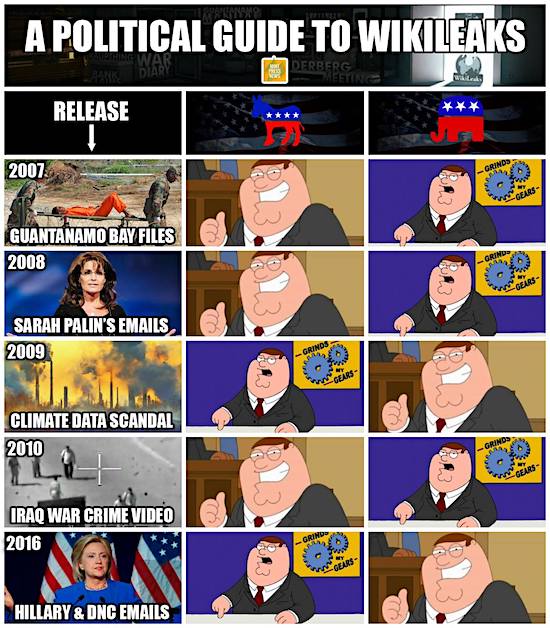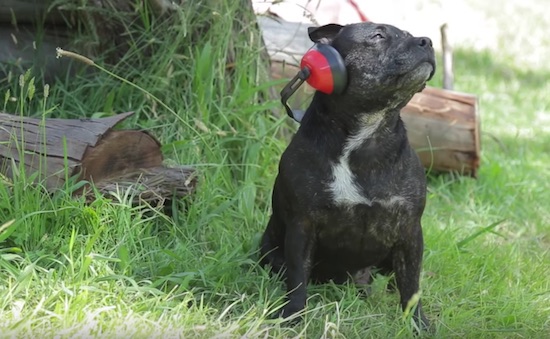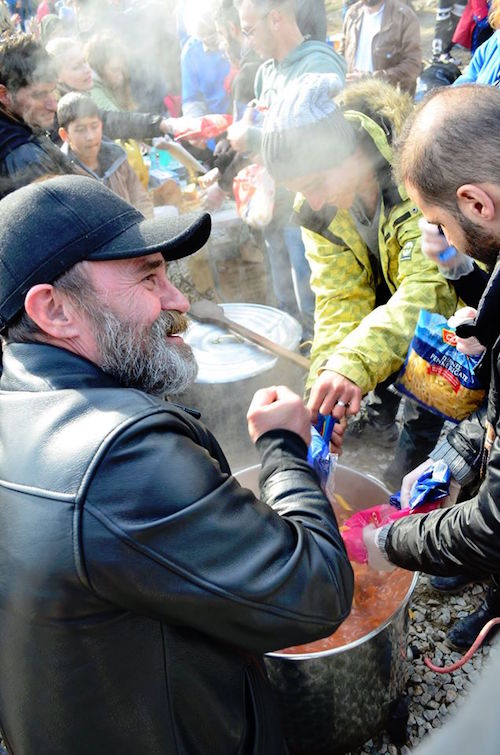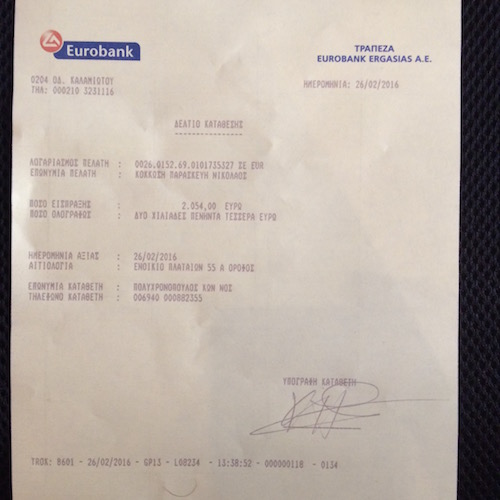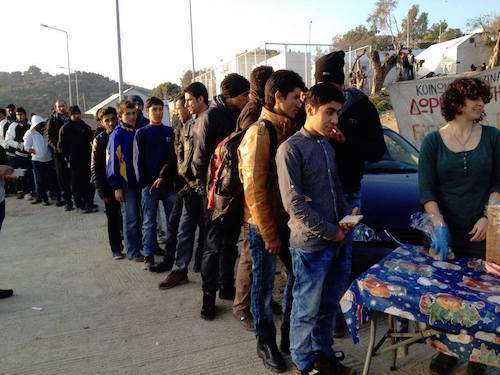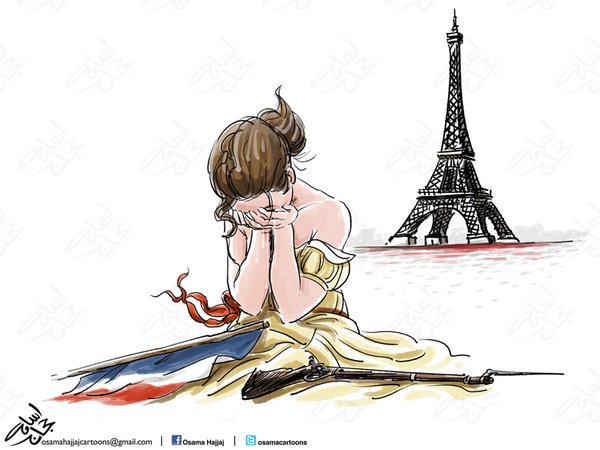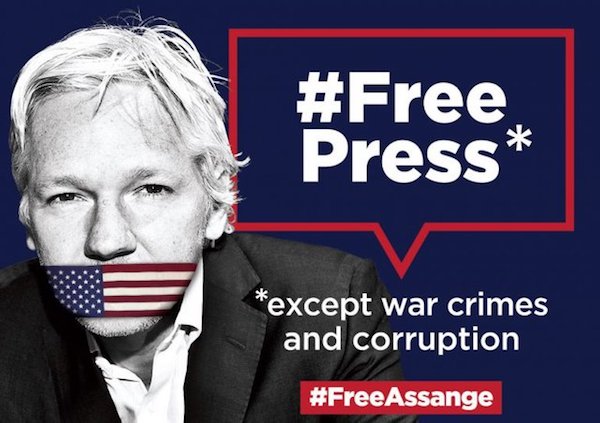

Hundreds of assessments of what the Assange charges mean. Turley’s not a bad place to start.
• What Assange Charges Could Mean For Press Freedom (Jonathan Turley)
For over a decade, there has been a raging debate over precisely what Julian Assange is – whistleblower, journalist, or spy. Now that question will have to be answered after the United States hit him with 17 new counts under the Espionage Act for receiving and publishing information from Army intelligence analyst Chelsea Manning. The Trump administration has now crossed the line that many counselled it to avoid – and may have triggered the most important press freedom case in the US in 300 years. While the status of Assange has long been hotly debated, his actions in publishing classified information on Wikileaks is a common component of journalism. Indeed, the most celebrated cases in history – such as the failed attempts to stop the release of the Pentagon Papers in 1971 – were based on the publications of classified evidence.
Assange’s supporters note that his publications revealed alleged war crimes in places like Afghanistan and Iraq that were unlikely to have been exposed otherwise. If it was a crime for Assange to receive and publish such information, much of the journalism in the US would become a de facto criminal enterprise. In April, the government avoided this threshold question by charging Assange with a single count of conspiracy to commit computer intrusion. The charge related to helping Manning obtain access to defence department computers in 2010. In doing so, the justice department stayed clear of charging him as a publisher as opposed to an intruder. That is until Thursday.
The charges were brought under the controversial Espionage Act of 1917. Passed after World War One, it was used to target anti-war activists and political dissidents. The law has long been denounced as unconstitutional in its criminalising of receiving and publishing classified information. It is no surprise that the justice department had to use this much-ridiculed law to achieve this ignoble goal. Counts nine through 17 against Assange concern the publications of “national defence information.” The justice department takes pains to try to argue that Assange is not a journalist and that the publication counts concern the disclosure of not just classified information but the actual names of intelligence sources. That however may establish that Assange is a poor journalist, but a journalist all the same.

Everybody does what WikiLeaks does. Just not as successful.
• A Threat to the Press and the American People (IC)
The indictment says that Assange and WikiLeaks “repeatedly sought, obtained, and disseminated information that the United States classified due to the serious risk that unauthorized disclosure could harm the national security of the United States.” That is almost a textbook definition of the job of a reporter covering national security at a major news organization. Take a look at the tips pages of most news outlets, and you’ll see a remarkable similarity between what journalists ask for and what WikiLeaks sought. The indictment goes on to say that “WikiLeaks’s website explicitly solicited censored, otherwise restricted, and until September 2010, ‘classified’ materials.”
Today, virtually every major news organization has a similar secure drop box where sources can provide information anonymously. WikiLeaks popularized that technique for soliciting anonymous leaks, but it is now common journalistic practice. “Assange personally and publicly promoted WikiLeaks to encourage those with access to protected information, including classified information, to provide it to WikiLeaks for public disclosure,” the indictment says. Nearly every national security reporter goes on television, gives speeches, or launches book tours to promote their work and hopefully obtain new sources. All of this raises an obvious question: If the government can charge Assange for conspiring to obtain leaked documents, what would stop it from charging the CIA beat reporter at the New York Times for committing the same crime?

Rachel Maddow is a giant blemish on our world.
• Professional #Assange Smearers Finally Realize His Fate Is Tied To Theirs (CJ)
“And, you know, I know you,” Maddow continued, pointing to the camera. “Given everything else that we know about the WikiLeaks guy, I can feel through the television right now your mixed feelings about what I am saying. I can feel what may be, perhaps, a certain lack of concern about Julian Assange’s ultimate fate, given his own gleeful and extensive personal role in trying to help a hostile foreign government interfere in our election in order to install their chosen president with WikiLeaks’ help. Okay? I know. Okay, I feel ya. I got it. But, it is a recurring theme in history, heck, it is a recurring theme in the Bible, that they always pick the least sympathetic figures to try this stuff on first.
Despite anyone’s feelings about this spectacularly unsympathetic character at the center of this international drama, you are going to see every journalistic institution in this country, every First Amendment supporter in this country, left, right and center, swallow their feelings about this particular human and denounce what the Trump administration is trying to do here. Because it would fundamentally change the United States of America.” Wow. Make no mistake, this is a hugely significant development. This isn’t just some columnist for the New York Times or the Guardian, this is Rachel effing Maddow, the Queen Mother of all tinfoil pussyhat-wearing Russiagate insanity.
This same pundit was just a couple of months ago not just smearing but outright lying about Assange, deceitfully telling her audience that the new legal rings closing around Assange were about his 2016 publications then instructing viewers not to Google anything about it because they’ll get computer viruses. Now that she’s recognized that this could actually hurt her and her network directly, she’s finally feeding her audience a different narrative out of sheer enlightened self-interest.

Violence is the sole language of empire.
• The Belligerence of Empire (Orphan)
Violence is the sole language of empire. It is this only currency it uses to enforce its precepts and edicts, both at home and abroad. Eventually this language becomes internalized within the psyche of the subjects. Social and cultural conditioning maintained through constant subtle messaging via mass media begins to mold the public will toward that of authoritarian conformity. The American Empire is emblematic of this process. There is mass compliance to the dictates of the ruling class and this occurs most often without any prompting or debate whatsoever. In this dictatorship of money the poor are looked at with ridicule and contempt, and are often punished legally for their imposed poverty.
But the social conditioning of the American public has led toward a bizarre allegiance to its ruling class oppressors. Propaganda still works here and most are still besotted with the notion of America being a bastion of “freedom and democracy.” The growing gap between the ultra-wealthy and the poor and the gutting of civil liberties are ignored. And blind devotion is especially so when it comes to US foreign policy. Most Americans still believe they live in the greatest country on the planet. They believe the American military to be noble and that they always reluctantly go into or are forced into war. Indeed, both the Democrats and Republicans possess an uncanny ability to bridge their ideological distances when it comes to defending US militarism, the Pentagon and the war machine of imperialism.
But this is tied to the defense of capitalism, the ruling class, and the ultimate reason for war: the protection of that class’s global capital investments. The persecution of Chelsea Manning, much like the case of Julian Assange, is demonstrative of this. It is a crusade against truth tellers that has been applauded from both sides of the American establishment, liberal and conservative alike. It does not matter that she helped to expose American war crimes. On the contrary, this is seen as heresy to the Empire itself. Manning’s crime was exposing the underbelly of the beast. A war machine which targeted and killed civilians and journalists by soldiers behind a glowing screen thousands of miles away, as if they were playing a video game.
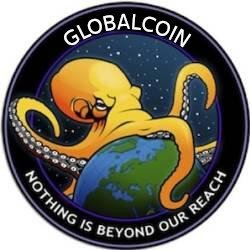

They would have already if they wanted.
• Australian Government Urged To Intervene In Assange Case (G.)
The Australian film-maker who spent 15-months in a Cambodian jail on spying charges says he fears Julian Assange is being used as an “example” to other journalists as part of what he described as “a fundamental attack on the fourth estate”. James Ricketson spent more than a year inside the overcrowded Prey Sar prison in Phnom Penh on spying charges before his release last September after a public outcry and lobbying by the Australian government. On Friday he told Guardian Australia he hoped the Morrison government would make “a forthright public statement” in support of Assange and the principle of press freedom.
“I would like to think the Australian government is woking in the background to forge some kind of resolution that is fair and equitable in the Julian Assange case,” he said. “Although it was not clear to me at the time, it’s now clear that from at least January last year there were fairly high-level representations being made to the Cambodian government on my behalf. “The government had its own reasons for why it needed to keep that secret [but] it would certainly be nice if it were to make a public statement to the effect that we’re concerned about the fate of Julian Assange and the impact of this extradition attempt on investigative journalism in Australia and worldwide.”

Talking about Australia…
• Trump Wants Investigation Into Australia’s Role In ‘Russian Hoax’ (G.)
Donald Trump has said he wants Australia’s role in setting off the FBI inquiry into links between Russia and his election campaign examined by the US attorney general, William Barr. It is a potentially explosive development for the historically solid US-Australian alliance and the first time Trump has publicly named Australia while discussing what he calls the “Russia hoax” and “witch hunt”. A spokesman for Marise Payne, Australia’s foreign affairs minister, responded to the comments on Saturday by saying: “Australia and the United States are the closest of allies.” “The government has not commented on these matters and doing so could prejudice any ongoing investigation,” he said.
Trump said he had declassified “potentially millions of pages” of intelligence documents related to surveillance activities on his campaign and Barr would be in charge of analysing it. “So what I’ve done is I’ve declassified everything,” Trump told reporters at the White House on Friday before leaving on a trip to Japan. “He can look and I hope he looks at the UK and I hope he looks at Australia and I hope he looks at Ukraine. “I hope he looks at everything, because there was a hoax that was perpetrated on our country.” Trump’s former campaign aide George Papadopoulos has claimed that Australia’s former high commissioner to the UK, Alexander Downer, spied on him during a meeting at a London bar in May 2016.
Downer has rejected this, but said that during the meeting Papadopoulos had told him Russia had damaging material on Trump’s presidential rival, Hillary Clinton. In an interview with the ABC’s Matt Bevan, Downer said Papadopoulos told him during the meeting he was confident Trump would win the election because the Russians had some information on Clinton which could be damaging to her if released. Downer then passed this information on to Canberra. Papadopoulos denies he ever mentioned Russia and Clinton during the meeting.

“..the US Intel “community” trafficked in fictitious malarkey supplied by Mrs. Clinton..”
• The Golem Strikes Back (Kunstler)
There’s perhaps a lot to dislike about Donald J. Trump, US President No. 45. Despite all the grooming and tailoring, there’s little savoir faire there. He tweets not like a mellifluous songbird, but in snorts like a rooting aardvark. His every predilection is an affront to the refined Washington establishment: his dark business history, his beloved ormolu trappings, his Mickey-D cheeseburgers, the mystifying hair-doo. Even so, the bad faith of his antagonists exceeds even Mr. Trump’s defects and vices. The plot they concocted to get rid of him failed. And, yes, it was a plot, even a coup. And they fucked it up magnificently, leaving a paper trail as wide as Interstate-95.
Now all that paper is about to fall over the District of Columbia like radioactive ash, turning many current and former denizens of rogue agencies into the walking dead as they embark on the dismal journey between the grand juries and the federal prisons. Hence, the desperate rage of the impeachment faction, in direct proportion to their secret shameful knowledge that the entire RussiaGate melodrama was, in fact, a seditious subterfuge between the Hillary Clinton campaign and a great many key figures in government up-to-and-including former president Barack Obama, who could not have failed to be clued-in on all the action. Even before the declassification order, the true narrative of events has been plainly understood: that the US Intel “community” trafficked in fictitious malarkey supplied by Mrs. Clinton to illegally “meddle” in the 2016 election.
[..] The evidence already public indicates that Robert Mueller must have known as early as the date of his appointment (and likely before) that the predicating evidence for his inquiry was false. After all, his lead prosecutor, Andrew Weissmann, was informed of that in no uncertain terms by Deputy Attorney General Bruce Ohr in 2016. Justice may seek to know why Mr. Mueller did not inform the target of his inquiry that this was so. The answer to that may be that Mr. Mueller’s true mission was to disable Mr. Trump as long as possible while setting an obstruction of justice trap — which also failed tactically.

“..Democratic organizers realized they’d come within a hair’s breadth of printing bumper stickers and posters for an unraveling one-man Enron.”
• Political Media Is a Hucksters’ Paradise (Taibbi)
Avenatti became an instant celebrity after he filed a lawsuit seeking to void the non-disclosure agreement between Trump and Daniels, in which she received a $130,000 payoff to be quiet about what she would later call “the least impressive sex I ever had.” In that, Avenatti had something cable television wanted more than anyone ever wanted anything: details about the president’s “smaller than average” tackle and Daniels’ tale of “getting fucked by a guy with Yeti pubes and a dick like the mushroom character in Mario Kart.” Avenatti leveraged being the gatekeeper of this story into daily TV appearances, where he quickly became a political figure in his own right, someone who would play the Democrats’ bare-knuckle answer to Trump.
By last summer in Iowa, he was already giving speeches as a presidential hopeful. CNN gushed: “Cribbing but amending Obama, Avenatti added, “When they go low, I say, we hit harder…” Whether by calling Michael Cohen a “thug,” or demanding an “immediate indictment” over the hush money issue, Avenatti could be counted on to take the maximally aggressive posture. Media figures couldn’t praise him enough. He was great, emotionally satisfying TV! Our own version of Trump! Ana Navarro compared him to the “Holy Spirit” on The View, while Joy Behar said “being a lawyer is minimal compared to what he’s doing.” MSNBC’s Stephanie Ruhle said, ”The Democrats could learn something from you.”
Brian Stelter, who later excused his admiration on the grounds Avenatti showed “Trump-like mastery” of media, said Avenatti should be taken “seriously as a contender.” In another forum he was called the “savior of the Republic.” Avenatti wasn’t the savior of anything. He turned out to be an epic buffoon and massive net minus for Democrat causes. His performance in the fight over Brett Kavanaugh’s Supreme Court confirmation last fall – where the Maya Angelo-quoting self-described feminist ended up having his own witness tell NBC he’d “twisted” her words – was just one faceplant. He was soon after arrested for domestic violence. This helped lead to cancellation of campaign events, as Democratic organizers realized they’d come within a hair’s breadth of printing bumper stickers and posters for an unraveling one-man Enron.

Empire.
• Trump Declares Emergency To Expedite Arms Sales To Saudi Arabia And UAE (CNN)
The Trump administration has declared an emergency to bypass Congress and expedite billions of dollars in arms sales to various countries — including Saudi Arabia and the United Arab Emirates — citing the need to deter what it called “the malign influence” of Iran throughout the Middle East. Secretary of State Mike Pompeo formally told lawmakers Friday of the administration’s plans. “These sales will support our allies, enhance Middle East stability, and help these nations to deter and defend themselves from the Islamic Republic of Iran,” Pompeo said in a statement that put the value of the sales at $8.1 billion.
In a Friday letter to congressional lawmakers, Pompeo said that he “determined that an emergency exists, which requires the immediate sale of the defense articles and defense services” to Saudi Arabia, the UAE and Jordan “in order to deter further the malign influence of the Government of Iran throughout the Middle East region,” according to a copy obtained by CNN. The notification comes on the same day as President Donald Trump’s announcement that he is sending an additional 1,500 US troops to the Middle East to counter Iran. Pompeo noted in his statement that “today’s action will quickly augment our partners’ capacity to provide for their own self-defense and reinforce recent changes to US posture in the region to deter Iran.”

First time they announce it anyway.
• For The First Time Ever, China Takes Over An Insolvent Bank (ZH)
There was a time when in the years following the financial crisis, every Friday the FDIC would report of one or more small and not small banks failing, as their liabilities exceeded their assets, who were taken over by larger peers with a taxpayer subsidy to cover the capital shortfall. And while this weekly event, also known as “FDIC Failure Friday” has faded from the US, for now, it has made a grand appearance in China. China’s financial regulators said on Friday the country’s banking and insurance regulator and the central bank, will take control of the small, troubled inner Mongolia-based Baoshang Bank due to the serious credit risks it poses.
The regulator’s control of Baoshang will last for a year starting on Friday, the People’s Bank of China (PBOC) and China Banking and Insurance Regulatory Commission (CBIRC) said on their websites. China Construction Bank (CCB) will be entrusted to handle the business operations of the small lender, based in the industrial city of Baotou, the statement said. Such a takeover by national authorities is extremely rare, and takes place amid gathering concerns among regulators and financial analysts about a renewed surge in bad debts…
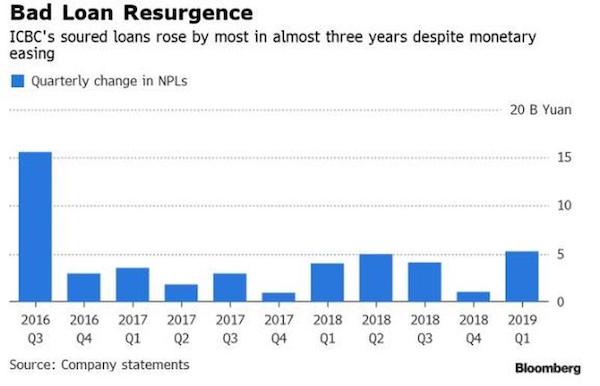
… a record pace of corporate defaults, amounting to 39.2 billion yuan of domestic bond defaults in the first four months of the year, 3.4 times the total for the same period of 2018…
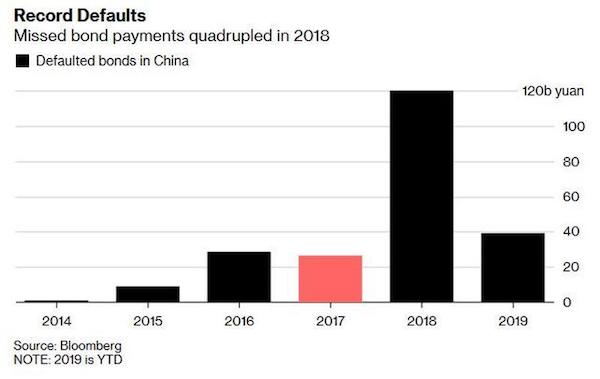
Moody’s analyst Yulia Wan told the WSJ that regulators likely decided to take over Baoshang to limit any fallout to businesses in Inner Mongolia. “The move is to reduce the risk of a shock to the local economy,” said said, adding that the Baoshang takeover appeared to be the first time that national authorities seized control of a bank since Chinese lenders started listing on stock markets in the 1990s. In the past when banks came under pressure, local authorities would pull together funds from local state-owned firms and investors, or have another bank stage a takeover.

He’ll claim it’s a witch hunt.
• EU Fraud Watchdog Considering Nigel Farage Investigation (G.)
The European Union’s anti-fraud watchdog is considering whether Nigel Farage should be investigated for any illegal activity over lavish payment from Arron Banks, the Guardian has learned. The agency, which goes by its French acronym, Olaf, revealed it was carrying out an assessment, which could lead to a formal investigation. This “initial assessment … does not mean that the individuals in question are guilty of any wrongdoing”, it said. While not a full-blown inquiry, it is a rare and significant step for Olaf to consider investigating a member of the European parliament. The European parliament this week opened an investigation into revelations made by Channel 4 that the insurance tycoon Arron Banks funded a lavish lifestyle for Farage in the year of the Brexit referendum.
In 2016, Farage received expenses of about £450,000, including rent on a Chelsea home, furniture, security and promotional trips to the US, where he attended the Republican national convention. Nothing was declared, an apparent violation of the European parliament’s code of conduct, which states that MEPs must report expensive gifts and attendance at events bankrolled by third parties. “We are aware of the press reports and public statements on the matter you are referring to,” a spokesperson for Olaf said, in response to questions from the Guardian. “It is only after such an initial assessment, which is currently ongoing, that Olaf decides whether or not to open an investigation.” The agency usually takes two months to carry out an assessment, which will examine whether the case falls under its remit and if there is “sufficient suspicion of fraud, corruption or any illegal activity affecting the EU’s financial interests”.

Death cult.
• We’ve Created A Civilisation Hell Bent On Destroying Itself (C.)
The coffee tasted bad. Acrid and with a sweet, sickly smell. The sort of coffee that results from overfilling the filter machine and then leaving the brew to stew on the hot plate for several hours. The sort of coffee I would drink continually during the day to keep whatever gears left in my head turning. Odours are powerfully connected to memories. And so it’s the smell of that bad coffee which has become entwined with the memory of my sudden realisation that we are facing utter ruin. It was the spring of 2011, and I had managed to corner a very senior member of the Intergovernmental Panel on Climate Change (IPCC) during a coffee break at a workshop. The IPCC was established in 1988 as a response to increasing concern that the observed changes in the Earth’s climate are being largely caused by humans.
The IPCC reviews the vast amounts of science being generated around climate change and produces assessment reports every four years. Given the impact the IPPC’s findings can have on policy and industry, great care is made to carefully present and communicate its scientific findings. So I wasn’t expecting much when I straight out asked him how much warming he thought we were going to achieve before we manage to make the required cuts to greenhouse gas emissions. “Oh, I think we’re heading towards 3°C at least,” he said. “Ah, yes, but heading towards,” I countered: “We won’t get to 3°C, will we?” (Because whatever you think of the 2°C threshold that separates “safe” from “dangerous” climate change, 3°C is well beyond what much of the world could bear.)
“Not so,” he replied. That wasn’t his hedge, but his best assessment of where, after all the political, economic, and social wrangling we will end up. “But what about the many millions of people directly threatened,” I went on. “Those living in low-lying nations, the farmers affected by abrupt changes in weather, kids exposed to new diseases?” He gave a sigh, paused for a few seconds, and a sad, resigned smile crept over his face. He then simply said: “They will die.”

